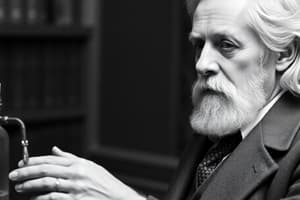Podcast
Questions and Answers
What was the fate of Albert Alexander after using penicillin?
What was the fate of Albert Alexander after using penicillin?
- He experienced immediate improvement but later developed complications.
- He passed away four days later despite using the medicine. (correct)
- He fully recovered and lived for many years.
- He was able to keep his eye and survive.
In which year did Alexander Fleming discover penicillin?
In which year did Alexander Fleming discover penicillin?
- 1928 (correct)
- 1918
- 1941
- 1935
What training did Alexander Fleming pursue before his research career?
What training did Alexander Fleming pursue before his research career?
- Medicine (correct)
- Biochemistry
- Pharmacology
- Veterinary Science
What accidental event led to the discovery of penicillin?
What accidental event led to the discovery of penicillin?
What type of bacteria was Fleming studying in his petri dishes?
What type of bacteria was Fleming studying in his petri dishes?
What significant discovery did Mary Hunt make during the Second World War?
What significant discovery did Mary Hunt make during the Second World War?
Which two individuals shared the Nobel Prize for Medicine with Alexander Fleming in 1945?
Which two individuals shared the Nobel Prize for Medicine with Alexander Fleming in 1945?
What was a major limitation in the initial use of penicillin before its mass production?
What was a major limitation in the initial use of penicillin before its mass production?
What does the phrase 'Under Florey’s watchful eye' imply about Florey's role?
What does the phrase 'Under Florey’s watchful eye' imply about Florey's role?
What recognition did Alexander Fleming receive for his contributions to science in 1944?
What recognition did Alexander Fleming receive for his contributions to science in 1944?
Flashcards are hidden until you start studying
Study Notes
Alexander Fleming: British Innovator
- Born in Scotland in 1881, Alexander Fleming moved to London at age 13 and trained as a doctor.
- Began a career in research at the University of London, focusing on illnesses and vaccines.
- Served with distinction in the Army Medical Corps during World War I before returning to research.
- Discovered penicillin in 1928 after spores of the Penicillium mould contaminated his petri dishes, inhibiting bacterial growth.
The Discovery of Penicillin
- Albert Alexander, a policeman, lost an eye due to an infected scratch from a rose bush in early 1941.
- Despite the immediate effects of penicillin on his infection, Alexander died after four days due to insufficient production of the drug.
- Howard Florey, an Australian scientist, rediscovered Fleming's work and began treatment of Alexander using penicillin.
Challenges and Breakthroughs
- Early production of penicillin faced difficulties; scientists struggled to find and replicate the mould.
- Mary Hunt discovered the mould on a melon in a grocery store, providing a sample large enough for consistent reproduction of penicillin.
- This single melon has since been the source of all penicillin produced to this day.
Recognition and Legacy
- Alexander Fleming was knighted in 1944 for his contributions to science.
- Awarded the Nobel Prize for Medicine in 1945, shared with Howard Florey and Ernst Chain.
- Fleming passed away on March 11, 1955, leaving a lasting legacy through the life-saving drug, penicillin.
Studying That Suits You
Use AI to generate personalized quizzes and flashcards to suit your learning preferences.




